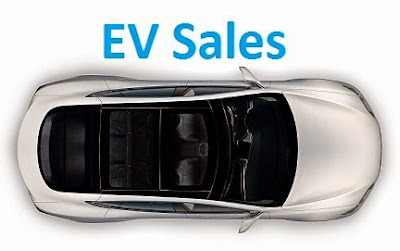
Nissan Leaf leads in depressed market
In May, some 2,900 units were registered in the Japanese PEV market, down 16% YoY, which is still better than the YTD result (-20%), this bad result, with Japan being the worst performing major market, is due to the top two sellers, with new 62kWh version failing to pull forward the Nissan Leaf sales, whose registrations are actually down 30% YoY, while the Toyota Prius PHEV is faring even worse, down 49% YoY, without any other reasonable explanation beyond the fact that demand is slowing down.
The 2019 PEV share is down to 0.8% share, down 0.2% regarding the 2018 result, and one wonders what can pull sales North of the 1% mark again.
Tesla Model 3? A Top 5 position seems possible, and maybe even a place as the Best Selling foreigner, but for a global change, we need a local hero.
The third significant plug-in model in Japan, the Mitsubishi Outlander PHEV, has roughly the same registrations of last year (2.182 units in 2019 vs 2.190 in 2018), so the growth perspectives won't come from here.
Honda has the Clarity PHEV being delivered in symbolic numbers (as in 10 to 20 units/month), while the much anticipated Honda e EV will only start to be delivered next year.
What's left? Mazda is still in EV denial, Subaru and Daihatsu are too dependent from Toyota's mistakes, while Suzuki is focusing it's electrification efforts in India...So do not expect much changes throughout 2019, which means another lost year for Japan. Maybe in 2020 things will change?
With all these hesitations and complications from local manufacturers, foreign brands, once a niche, are winning share every passing month, and BMW is profiting the most, now with 13% share, being ahead of Mitsubishi (12%).
If we add Mini to the tally, the BMW Group reaches 15% share, just 1% below Toyota, so it won't be long until BMW becomes the second best plugin brand in Japan.
And to think in 2016, foreign OEMs has just 2% share…(1% BMW + 1% Tesla)


Jose,
ReplyDeletePerhaps it's just a matter of insufficient awareness (among the general public in Japan) regarding the importance of the focus on decreasing the air pollution caused by ICE vehicles.
Perhaps that is the main cause/reason for the current low demand for EV's in Japan?
What could the Japanese government do to make it interesting for new car buyers to choose an EV model instead of an ICE model?
Cheers
Hi José, as previously mentioned to you, one can't grasp japanese automotive market following worldwide metrics and "foreign eyes". One thing you are correct: BMW Group will be Big In Japan. On the other hand, Tesla has very slim chances to reach top positions until the future Model Y is available, 2021? Don't overlook the fact that the only sucessful BEV (by japanese standards) is the Leaf (a Nissan), and none of the remaider japanese carmakers are fully commited to BEVs, so Tesla reaching meaningful places with just BEVs in a country eating & breathing hybrids, plug-ins and fuel-cells is just paranoia. Not happening, soon.
ReplyDeleteCould be, and HEVs are also popular, so people might not be willing to leave the "eco friendly" hybrids for something else.
ReplyDeleteAlso the government in Japan is really pushing Hydrogen Vehicles over EVs and doesn't seem to have any interest in strongly supporting EV adoption.
ReplyDeleteJapan is in a tough bind. Because of the Fukushima disaster they are under pressure to phase out their nuclear power plans, which leaves them with few options to generate sufficient electricity to support even current demand. Hydrogen may be appealing to them because it does not burden their already stressed electrical grid.
Still a strange policy: unless the hydrogen is actually generated mostly from electricity -- which won't be happening any time soon, by their own admission -- it just entrenches their dependence on imported fossil fuels... With renewables OTOH they could reach energy independence for the first time.
DeleteI wonder whether the Japanese public might be bought too much into the "hydrogen is the future, EVs are inferior" scam?...
ReplyDeleteThere isn't a scam per se: what exists is a favouring by government/japanese automakers to promote hydrogen society, an ecosystem not only composed by personal vehicles "running on" hydrogen. Japanese carmakers are the only ones drumming into obsession the key that few people have access to plugs at home (a big reality in Japan). This, in the meantime protects the japanese automakers into keeping churning ICE on their "eco friendly" hybrids. Not a coincidence, big competitors (korean carmakers/chinese carmakers) do not have a hold in this market, the only allowed are European (the most successful) and American.
DeleteAnd the japanese public (the masses) agree with this and love it.
The "plugs at home" argument always baffles me. All residential roads are electrified anyway for street lightning -- adding outlets for EV charging is not such a big deal. (Indeed it's reality in Norway.)
DeleteMaybe because electricity (71%) in Japan comes from fossil fuel and they think EVs is not that green and prefer hybrids insted (but I don't agree with them of courts).
ReplyDeleteMy proposal for the goverment would be: Promote and use the disruptive efficiency of small 100% EVs in practical pilot projects.
ReplyDeleteThank you for all your valuable input, there were some interesting ideas coming up, i hope this post reaches someone in Japan, as there's some nice food for thought here.
ReplyDeleteJune YTD
ReplyDeleteLEAF 1387 15041
Prius PHV 1030 4190
Outlander PHEV 439 2622
Mirai 88 362
Minicab-MIEV 14 130
i-MIEV 8 48
Clarity PHEV 1 46
A small question, what is the source of the Japan data? One reason for the question being the BMW figures are much higher here than in the source which I use, i.e. Fourin. Thanks.
ReplyDeleteCan you share the website link? my email is: efeelblog@gmail.com
Delete